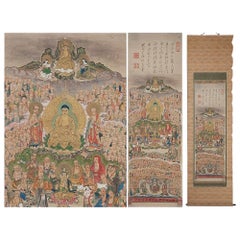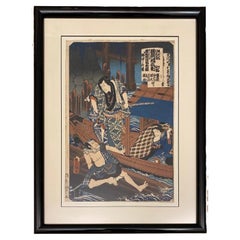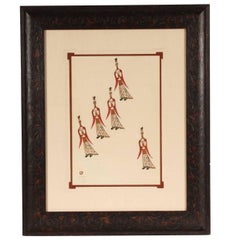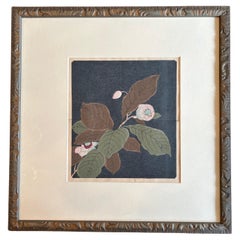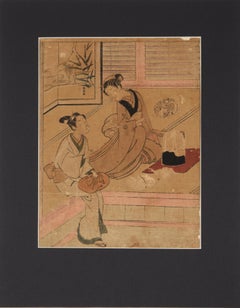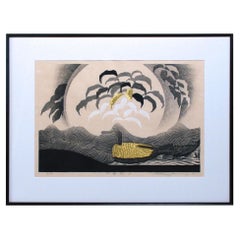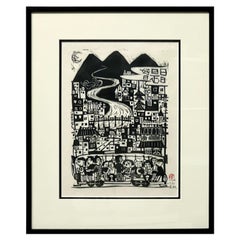Woodblock Japan
Antique 19th Century Japanese Meiji Paintings and Screens
Fabric
Antique 19th Century Japanese Edo Prints
Wood, Paper
Vintage 1960s Japanese Edo Prints
Wood
Early 20th Century Japanese Other Prints
Paper
1940s Landscape Paintings
Ink
18th Century Edo Figurative Prints
Ink, Rice Paper, Woodcut
1860s Landscape Prints
Paper, Woodcut
Vintage 1980s Japanese International Style Prints
Paper
Vintage 1970s Japanese Modern Prints
Wood, Paper
Antique 19th Century Japanese Edo Prints
Paper
Antique 19th Century Japanese Chinese Export Prints
Paper
Vintage 1960s Japanese Showa Prints
Paper
Vintage 1950s Japanese Modern Prints
Paper
Antique 19th Century Japanese Edo Prints
Paper
20th Century Portrait Prints
Woodcut
1990s Japanese Mid-Century Modern Prints
Paper
1920s Edo Landscape Paintings
Paper, Ink, Woodcut
Vintage 1970s Japanese Modern Prints
Glass, Wood, Paper
19th Century Portrait Prints
Woodcut
Antique 1880s Japanese Japonisme Prints
Papercord, Wood
Antique 19th Century Japanese Prints
Paper
Antique Mid-19th Century Japanese Edo Prints
Paper
19th Century Portrait Prints
Woodcut
Early 1800s Edo Portrait Prints
Woodcut
Antique Late 19th Century Japanese Prints
Paper
Antique Early 19th Century Japanese Prints
Paper
Antique Early 19th Century Japanese Edo Prints
Paper
1850s Edo Landscape Prints
Woodcut
Vintage 1930s Japanese Prints
Paper
Antique 19th Century Japanese Meiji Prints
Paper
Vintage 1930s Japanese Showa Prints
Paper
Antique 19th Century Japanese Edo Paintings
Paper
Early 20th Century Japanese Edo Prints
Paper
Antique 19th Century Japanese Meiji Paintings and Screens
Paper
Vintage 1960s Japanese Paintings and Screens
Paper
Vintage 1970s Japanese Modern Prints
Glass, Wood, Paper
Antique Late 19th Century Japanese Meiji Prints
Paper
Antique Late 19th Century Japanese Meiji Prints
Paper
Antique Late 19th Century Japanese Meiji Prints
Paper
Vintage 1930s Japanese Showa Prints
Wood, Paper
Antique Early 19th Century Japanese Prints
Paper
Late 20th Century Japanese Mid-Century Modern Prints
Paper
19th Century Edo More Prints
Paper, Woodcut
Vintage 1980s Japanese Modern Prints
Glass, Wood, Paper
Vintage 1970s Japanese Mid-Century Modern Prints
Paper
19th Century Figurative Prints
Woodcut
20th Century Prints
Paper
20th Century Prints
Wood
20th Century Prints
Paper
Vintage 1960s Japanese Mid-Century Modern Prints
Paper
Vintage 1980s Japanese Mid-Century Modern Prints
Paper
Antique 19th Century Japanese Edo Prints
Paper
20th Century Landscape Prints
Etching
20th Century Portrait Prints
Woodcut
Antique Early 19th Century Japanese Prints
Paper
Vintage 1980s Modern Prints
Paper
20th Century Japanese Showa Prints
Paper
Early 1900s Naturalistic Animal Prints
Woodcut
Mid-20th Century Japonisme Prints
Wood, Paint, Paper
Antique 19th Century Japanese Prints
Paper
- 1
- ...
Bring Authentic Japanese Woodblock Prints into Your Home
For concision, power and delight, it’s hard to beat authentic Japanese woodblock prints, the products of an artistic tradition that is aging very well indeed.
The genre, unique to Japan, grew out of 17th-century developments in printing and book publishing. The form became known as “picture of the floating world,” an evocative name that captures the dreaminess of many of the scenes (which were often erotic). In an overview of the years from 1680 to 1938 in Taschen’s Japanese Woodblock Prints, author Andreas Marks presents the reader with a brief history of the development of woodblocks, describing for example how extra colors were added, and then devotes most of the following chapters to significant individual artists over the centuries. Four of the most common subjects are delineated: beauties, actors, landscapes and bird-and-flower compositions. Famous for book illustrations as well as paintings, Japanese ukiyo-e artist Katsushika Hokusai captured the grand power of nature by depicting Mount Fuji, Japan’s tallest peak, as a tiny triangle seemingly being swallowed by an enormous wave in his The Great Wave off Kanagawa.
Some of the great creators of the 18th and 19th centuries, such as Utagawa Hiroshige (1797–1858), are still well known, their works frequently shown in museums today. European artists like Van Gogh and Manet were indelibly influenced by them, for reasons that are plain.
But Marks’s stated aim is to spread his attention around and not “single out the handful of ‘stars’ commonly found in books and exhibitions.” Some of the later talents covered in his compendium — like the relatively unfamiliar Yamamura Koka (also known as Toyonari), whose beguiling 1920s works convey suggestions of the Jazz Age — the heady, optimistic era between the end of World War I and the crash of 1929 — may be the biggest revelations.
Find a collection of original Japanese woodblock prints for sale on 1stDibs.
